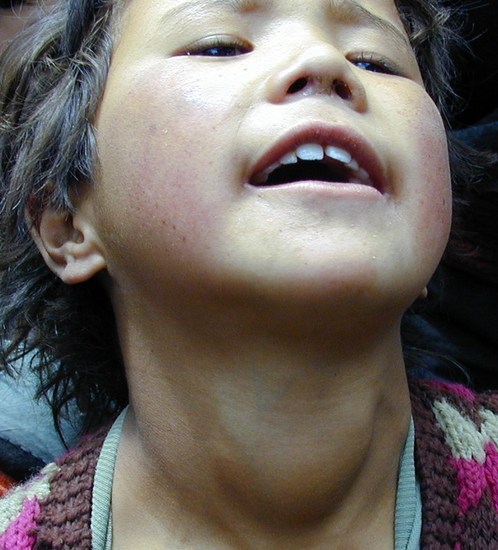Blog
Nutrition focus: Iodine

Iodine is a trace element found naturally in some foods and added to others. Iodine is an essential component of thyroid hormones, T3 and T4. Thyroid hormones are the critical regulators of metabolic function at all levels in the body.
The Earth’s soil contains varying amounts of iodine. In parts of the world, the soil is deficient in iodine and thus, crops are iodine deficient as well. Areas that are deficient in iodine are often referred to as “goiter belts” where many people develop iodine deficiency and secondarily, a thyroid deficiency leading to the formation of a goiter or mass in the thyroid gland. A goiter, an enlarged thyroid gland, occurs because the thyroid gland keeps trying to trap more iodide to make thyroid hormones. See below for what a goiter looks like:

One large goiter belt in the US is the Great Lakes region. Around the world mountainous regions such as the Himalayas, the Alps, the Andes are iodine deficient. River valleys around the world are also susceptible to iodine deficiency due to flooding. It is estimated that about 38% of the world’s population live in iodine deficient areas.
Iodine is found in the body primarily as iodide. Iodide is quickly absorbed in the stomach and small intestine, entering the circulation and almost immediately concentrated in the thyroid gland to make thyroid hormones. The thyroid gland contains about 75% of the body’s iodide.
Babies, growing children ages 9-13y along with women who are pregnant or breastfeeding have the highest needs for iodine. Urine levels in the range of 150-250 mcg/dl are deemed sufficient. In a NHANES health survey done from 2005-2008, 57% of pregnant women had an average urine level of 125 mcg/dl. Thus, the majority of pregnant women are deficient in critical iodine needed for thyroid function.
Pregnancy related iodine deficiency can have irreversible effects on the developing brain. In infants and children, low iodine can cause neurodevelopmental deficits with lower IQ scores. In addition, mild to moderate iodine deficiency is associated with ADHD.
Fruits and veggies contain iodine in varying amounts depending on soil content, fertilizer and irrigation patterns. Seaweed and seafood contain an abundance of iodine usually. Salt iodization is another major source of iodine worldwide and is accessible to about 70% of households.
Fortified grains and dairy (due to the fortification of grains fed to dairy animals) are the primary sources of iodine in the American diet along with iodized salt. However, gourmet salts often are not iodized. In the United States, most of our salt intake is from processed foods, which use NON-IODIZED salt. So, there is an increased risk of iodine deficiency with the typical American diet that is high in processed and refined foods.
Iodine is a tricky and critical trace element. If you live in a goiter prone area, make sure to use iodized salt and stay away from processed foods which are not healthy anyways!
Searching for the right mix of remedies to keep in your medicine cabinet? Enter your email at www.wholekidspediatrics.com/yoga-and-wellness to download a free and awesome guide called the The Wholistic Medicine Cabinet. If you are local, you can use the 25% discount email on any one class or workshop at the Whole Yoga & Wellness studio.
New workshop for you pregnant women out there... are you planning on breastfeeding but feeling a bit apprehensive about it? Come to our prenatal breastfeeding basics class on May 7th from 7-8 p at Whole Yoga & Wellness. Leave feeling prepared to feed your new baby!! Learn more and register at http://www.wholekidspediatrics.com/yoga-and-wellness
